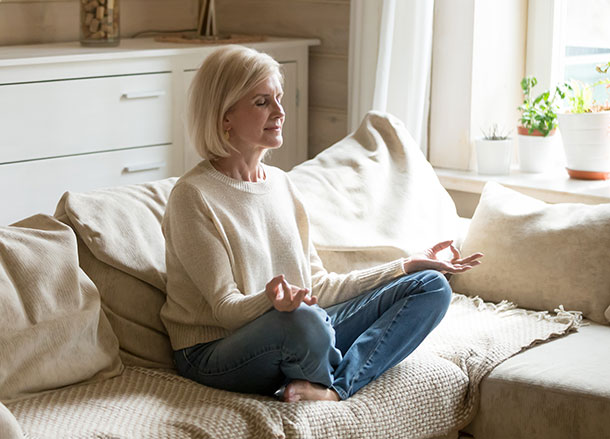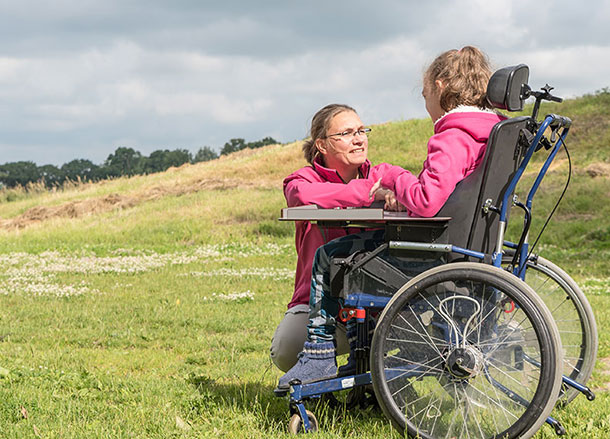Caring for a family member with disability is a role filled with immense love but also with challenges. You’re always on the go, from daily tasks to appointments, ensuring everything runs smoothly.
But when was the last time you paused to think about yourself? Just as a plant needs water to nourish others with its fruits, you also need care to continue giving.
Below is a guide to finding those moments of self-care, ensuring you and your family thrive together.
Mental health

When you’re busy caring for someone you love, it’s easy to get into the habit of prioritising everyone else’s needs over your own. While this is admirable, your needs and your mental health are also very important. Taking moments for self-reflection, relaxation, and self-care can make a world of difference in both your life and the life of the person you’re caring for.
Here are some of our top mental health self-care tips for carers.
Set clear boundaries
You play a crucial role in the wellbeing of another individual as a carer. But you cannot do everything, as you have your own needs and limits. Continuously pushing beyond your limits can lead to burnout, stress, and even health issues. It can also lead to mistakes or oversights, which may affect the person you’re caring for.
Another reason it’s okay to say “no” sometimes is that not setting limits can lead to feelings of resentment for your situation. By setting boundaries, you ensure that you’re giving in a way that feels sustainable and fulfilling rather than obligatory.
Here are our tips for setting boundaries:
- Listen to your feelings. If you’re tired or stressed, take a break, even for a few minutes.
- Talk to your family. Let them know when you need help or a break.
- Practice saying “no.” Turning down extra tasks is okay if you’re already doing a lot.
- Commit to the boundaries you set. If needed, explain that saying “no” is not a rejection of responsibility but rather an acceptance of the reality that everyone has limits.
Practise mindfulness and meditation
Mindfulness and meditation can offer a moment of calm and centredness for carers and greatly improve mental health.
Mindfulness refers to the intentional practice of being fully present and engaged in the current moment without judgement. In those moments, you develop a heightened awareness of your own thoughts, emotions and physical sensations.
As a carer, you also take those mindful moments to attune yourself to the needs and feelings of the one you are caring for. This not only helps you to be even more attentive, but it can reduce feelings of being overwhelmed and make you feel even more connected.
Meditation goes hand in hand with mindfulness because it adds structure to the practice, anchoring you in the present moment. It’s not only a great way to relax and replenish your emotional reserves. It can also help you find those moments of mindfulness at other times.
You may think of meditation as something time-consuming that requires a class, but you can benefit from short sessions at home or wherever you find time. Even meditating for a few minutes a day can be helpful.
Try this:
Find a quiet spot. Sit or lie down. Close your eyes. Take deep breaths. Focus on your breathing. If your mind starts to wander, that’s okay. Just bring your thoughts back to your breath.
Do this for a few minutes each day. You can use mindfulness and meditation apps such as Calm, Headspace and Smiling Mind to keep you on track.
Seek professional help if you need it
If you’re feeling very sad, stressed, or overwhelmed for a long time, talk to someone who can help. They can be:
- Therapists or counsellors: They are trained to listen and give advice.
- Support groups: These are groups where people with similar experiences come together to talk and help each other.
- Hotlines: You can call 24/7 mental health support services, such as Beyond Blue, when you need to talk to someone immediately.
Have a look at Carers Victoria’s website. They offer support and resources for carers. They also organise events where you can get together with other carers in a social setting.
Physical health

A strong body is as important as a healthy mind. Not only does it ensure that you have the endurance for any physical tasks that caring for your loved one could require, it also helps keep your energy levels high. With good energy, you’ll be alert, responsive, and resilient if anything unexpected happens.
Below are some top tips for maintaining your physical health as a carer.
Get regular exercise
Getting regular exercise as a carer is vital. Moving your body helps keep your muscles strong, your heart healthy, and your mind clear. If you have a passion for activities like going to the gym, playing tennis, swimming or any other exercise, lean on your support system to help carve out time for what you love.
However, with busy schedules, it might not always be feasible to engage in these activities. For those moments when you can’t make it to your favourite exercise spot, consider these alternatives:
- Walking: Even a short walk around the block can make a difference.
- Stretching: Take a few minutes every time you get a chance to stretch your arms, legs and back.
- Dancing: Put on your favourite song and dance for a few minutes. It’s fun and good for your body!
Eat healthy food and hydrate
Eating healthily and staying hydrated can be extra challenging for carers, but with some planning and creative strategies, you can ensure you’re nourishing your body despite your hectic schedule. Here are some tips:
Master meal-planning
On a less busy day, prepare healthy meals in batches. Store them in the fridge or freezer in portion-sized containers. Opt for foods that are easy to eat with one hand or on the go. Think smoothies, wraps, or energy bars. This way, even if you’re occupied, you can still have a bite.
Set up a healthy snack station
Another thing you can try is setting up a snack station in your home filled with healthy options like nuts, seeds, cut-up fruits, and veggies. Whenever you’re passing by, grab a handful.
Track your hydration
Most habit-tracking apps have features that remind you to drink water and track your daily intake. You can reach those daily hydration goals by always keeping a water bottle by your side, or placing them strategically in the rooms where you spend the most time each day.
Consider grocery or meal kit delivery
If finding time to shop or cook is challenging, consider using an online grocery delivery service. Meal kit delivery can also remove the pressure of deciding what’s for dinner, even just a few nights a week, by sending you a recipe and exactly the ingredients you need.
Get adequate sleep and rest
Getting enough sleep can be challenging when caring for someone, especially if they have irregular sleep patterns or require attention at night. But here are some creative ways to ensure you get the rest you need:
Sleep banking
If you know there will be nights when your sleep might be interrupted, try to “bank” sleep by taking naps or going to bed earlier on the days leading up to it. This way, you have some extra rest stored up.
Sleep shifts
Consider splitting the night into shifts if another caregiver or family member is available. One person can rest fully during the first half, while the other takes the second half.
Quiet zones
Create a quiet zone in your home where you can retreat for short power naps. It can make a difference, even if it’s just a corner with a comfortable chair and noise-cancelling headphones.
Sleep aids
Use tools like white noise machines, blackout curtains, or earplugs to maximise the quality of your sleep, even if the quantity might be less.
Practical self-care tips for carers

Build a solid support system
If you have friends or fellow carers nearby, plan regular catch-ups over coffee. Use these times to talk about what you’re going through, get advice, or just hang out. Sharing your experiences and feelings with others provides a sense of relief, understanding and perspective that is often difficult to achieve on your own.
If meeting in person isn’t feasible, have virtual coffee breaks. These online sessions can be just as uplifting. The important thing is to stay connected with others to help you bounce back from tough times.
Another thing to try is to seek support from other family members. You can ask them to assist with tasks like preparing meals or household chores or have them stay overnight for company and support.
Use these quick breaks to relax or spend time on yourself. If you have a bicycle, take a quick ride around your neighbourhood to get some fresh air and clear your mind.
Find a task management system that works for you
Caring for someone often feels like a whirlwind of responsibilities, making us feel overwhelmed when thinking about all the tasks ahead. So, focusing on each task and breaking down larger tasks into smaller steps can help you regain one step at a time is crucial.
Apps like Evernote or Todoist can help you organise your days if you prefer apps or digital checklists. If you’re more of a paper and pen organiser, coloured-coded and tiered checklists to help prioritise may be the key to unlocking efficiency in the day-to-day. There’s no right or wrong way here, but finding a system that works for you can go a long way toward carving out blocks of time for rest and self-care.
If it’s still too much, look to your support network for the resources you need to take some time for self-care. Caring is demanding, so finding that time can help you replenish your energy and bounce back stronger.
Remember that it’s always okay to change your approach or seek additional support if your schedule feels too overwhelming. Something that’s working for you and your family at one stage may not work forever as the needs of you or your loved one change.
Take advantage of brief breaks when you can
Be on the lookout for short breaks during your days to help you recharge. Having longer breaks is certainly important, but planning quick five-minute breaks that you’re looking forward to can also be a great way to recharge and lift your spirits. Schedule them on your to-do list or tee them up as rewards for yourself during the day.
Got five minutes? Have a micro-adventure – do a quick puzzle, doodle, or dance to a favourite song. These short bursts can be refreshing.
You can also have themed days. Dedicate specific days to certain activities you love. For example, “Music Mondays,” where you discover a new song or “Wanderlust Wednesdays,” where you watch a short travel video.
And once in a while, transform your living space into a mini-retreat. Light some candles, play calming music, and indulge in a home spa session or meditation.
Check out Mambourin Carer’s Corner

Having the right help makes caring for others easier. That’s why we made Carer’s Corner, where you can find trusted tips, special deals, and events for carers in the west. You can also share your thoughts and questions.
You can also contact us if you’re looking for more information.
